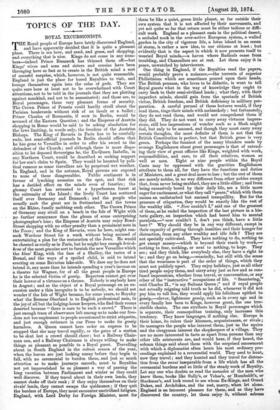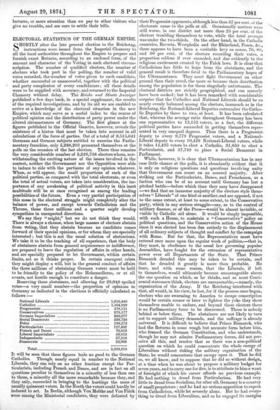TOPICS OF THE DAY.
ROYAL EXCURSIONISTS.
THERoyal people of Europe have lately discovered England, and have apparently decided that it is quite a pleasant place. There is sea here, and sand, and grass, and shopping, and everything that is nice. Kings do not come in any num- bers—indeed Prince Bismarck has thinned them off—but Kings' wives and sons and sisters and cousins have been thronging here so fast as to create in the British mind a sort of amused surprise, which, however, is not quite reasonable. England is just the place for bored Royalties to visit, and lounge themselves again into the calm of gods. They are quite sure here at least not to be overwhelmed with Court attentions, not to be told in the journals that they are plotting against mankind, and not to be assassinated; and those are, to Royal personages, three very pleasant forms of security. The Crown Prince of Prussia could hardly stroll about the Parisian boulevards without 'risk of an insult or a bullet ; Prince Charles of Roumania, if seen in Berlin, would be accused of the Eastern Question ; and the Empress of Austria shopping in Rome would be said to be asking absolution for the laws limiting, in words only, the freedom of the Austrian Bishops. The King of Bavaria in Paris has to be carefully rude' lest semi-official journals in Berlin should affirm that he has gone to Versailles in order to offer his sword to the defenders of the Church ; and although there is more dispo- sition to let deposed Sovereigns be, the Ex-Queen Isabella, in any Northern Court, would be described as seeking support for her son's claim to Spain. They would be haunted by poli- tical rumour as some travellers are by perpetual wet weather. In England, and in the autumn, Royal persons are exposed to none of these disageeables. Public sentiment is in favour of lynching assassins on the spot, and that risk has a decided effect on the minds even of fanatics ; the gloomy Court has retreated to a hyperborean forest at the extremity of the Island ; the lively Court has scattered itself over Germany and Denmark; and the people who usually mob the great are in Switzerland and the towns on the Rhine, fussily mobbing each other. The Crown Prince of Germany may stroll on a beach in the Isle of Wight with no further annoyance than the gleam of some enterprising photographer's lens ; the Empress of Austria may enjoy Bond- Street shopping with no other penalty than a prominent note in • the Times; and the King of Bavaria, were he here, might ran- sack Wardour Street for a week without being accused of entertaining a plan for the restoration of the Jews. He would be cheated as coolly as in Paris, but he might buy enough bric-a- brac of the most genuine sort to furnish the new Versailles which the blase King, with the face of a Shelley, the tastes of a Bernal, and the ways of a spoiled child, is said to intend erecting on some Bavarian lake-side. We dare say he does not intend it, any more than he intends spending a year's income on a theatre for Wagner, for of all the great people in Europe lie is the selected victim of gossip. Reporters cannot get over their horror of a virtuoso on a throne. Nobody is anybody here in August ; and as the object of a Royal personage on an ex- cursion under a thin incognito is to be nobody, we should not wonder if the Isle of Wight became, for some years, to Royalty what' the Bernese Oberland is to English professional men, to the joy of all but the lodging-house keepers, who find their rooms deserted because "there is sure to be such a crowd." There is just enough trace of observance left among us to make our free- dom not too unpleasant to people accustomed to strict etiquette, and just enough reticence in our Press to make its gossip harmless. A Queen cannot here order an express to be stopped that she may travel rapidly, or the gates of a station to be shut lest a crowd should cheer ; but a Railway Chair- man can, and a Railway Chairman is always willing to make things as pleasant as possible to a Royal guest. Travelling about in South England in the softest season of the year, when the leaves are just looking sunny before they begin to fall, with no ceremonial to burden them, and just so much attention as to make journeys smooth, must to Royalties not yet impoverished be as pleasant a way of passing the long vacation between Parliament and winter as they could well discover. If they travel about in their own lands, they cannot shake off their rank ; if they enjoy themselves on their rivals' lands, they cannot escape the quidnuncs ; if they quit the borders of Europe, they must encounter uncivilised fatigues. England, with Lord Derby for Foreign Minister, must for them be like a quiet, green little planet, so far outside their own system that it is not affected by their movements, and yet not quite so far that return must be either tedious or diffi- cult work. England as a pleasant oasis in the political desert, a secluded nook in the over-active European system, a walled garden in the city of vigorous life, a lotus island in an ocean of storm, is rather a new idea, to our citizens at least ; but evidently that is the aspect in which it now presents itself to wearied Royal minds,—a haven where Radicals cease front troubling, and Chancellors are at rest. Let them enjoy it in peace, unwatched by interviewers. One thing in 'England, if the I:loyalties read the papers, would probably prove a nuisance,—the torrents of superior Philistinism which are sometimes poured upon their heads. The British penman, who loves to be didactic is wont to tell Royal guests what in the way of knowledge they ought to carry back to their semi-civilised lands ; what they, with their imperfect minds, should gain from the spectacle of British virtue, British freedom, and British deficiency in military pre- paration. A careful perusal of those lectures would, if they read them, tinge their minds with melancholy ; but fortunately, - they do not 'read them, and would not comprehend them if they did. They do not want to carry away virtuous 'impres- sions, still less impressions of wonder such as a Shah might feel, but only to be amused, and though they must carry away certain thoughts, the most definite of them is not that the British Constitution is perfect, but that British grass is very green. Perhaps the funniest of the many blunders made by average Englishmen about great personages is that of extend- ing their view of great officers like Kings, weighted with work, responsibilities, and case, to all their relatives, women as well as men. Eight or nine people within the Royal Caste may be oppressed with the gravities Englishmen attribute to them all, for they have the functions and duties of Ministers, and a great deal more to lose ; but the rest of them. are merely nobles, in no way different from other nobles except that, from never being snubbed, they are a little sillier; and from being excessively bored by their daily life, are a little more eager for excitement, or what they call " peace " which with them. means an undisturbed but amused tranquillity. But for the pressure of etiquettes, they would be exactly like the rest of the wealthy idle. "Now couldn't I," said one of the greatest of them as he ended the inspection of the last picture in a his- toric gallery, an inspection which had bored him to mental paralysis,—" now couldn't I, don't you think, have a little beer 1" Why should they be in any way different, except in their capacity of getting through inanities and their hunger for distraction from any other wealthy and idle folk? They are not specially cultivated. They have nothing to do' nothing to. get except money—which is beyond their reach by work,— nothing to fear, nothing, or next to nothing, to hope. They are ; and they think, like everybody else, they have a right to be and they go on being,—weariedly, but still with the sense that the weariness is part of the order of things, which they must not publicly upset. They enjoy holidays, just as all other. tired people enjoy them, and carry away just as few and as con- fused impressions, whether from travel, or conversation, or any other of the " instructive " occupations of life. "Sauntering,' said Charles H., "is my Sultana Queen ;" and if royal people not actually reigning told truth as he did, whenever it did not pay him to tell lies, they would apply his felicitous epithet to. gossip,—clever' lightsome gossip, such as in every age and in every family has been to Kings, however great, the one irre- sistible charm. The one attribute in Royal personages which is separate, their cosmopolitan training, only increases this tendency. They know languages, if nothing else. Europe is their home, its rulers their kinsmen, acquaintances, or rivals ; its managers the people who interest them, just as the squire and the clergyman interest the shopkeepers of a village. They are no more interested in facts as apart from persons than any other idle aristocrats are, and would hear, if they heard, the solemn things said about them with the surprised amusement with which a diplomatist often hears his most ordinary pro- ceedings explained to a reverential world. They used to hunt, now they travel ; and they hunted and they travel for distrac- tion from the ennui inseparable from a life which has all the ceremonial burdens and so little of the steady work of Royalty. Let any one who doubts us read the memoirs of the men who knew them, books like Sully's, or Vehse's, or Humboldt's, or Stockmar's' and look round to see whom Ex-Kings, and Grand Dukes and Archdukes, and the rest, marry, when let alone. England is an innocent pleasure for them, and as they have discovered the country, let them enjoy it, without solemn
lectures, or more attention than we pay to other visitors who give no trouble, and are sure to settle their bills.































 Previous page
Previous page